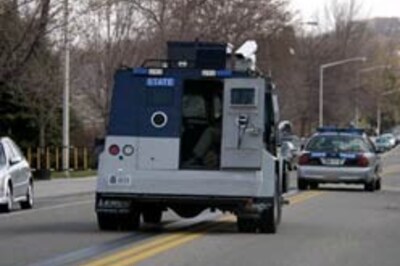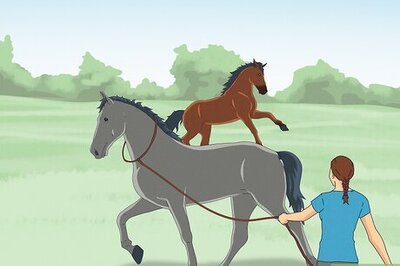
views
We’re in Jhabua’s Alirajpur district sitting in the house of Shankar Tadwal, a tribal rights activist, who has been directly or indirectly involved with nearly every tribal centric outfit that has been founded in Madhya Pradesh.
The entrance of his house is lined with portraits of adivasi icons. Among them is a portrait of BR Ambedkar. Inside, his room turns out to be a fully functional library. There are books on adivasi history, on its culture, some of which he himself has written. And there are almirahs stacked with legal paperwork related to court cases that he’s fighting.
Soon we get to the subject of ongoing elections. Tadwal begins by locating for us the space that emerging adivasi leaders are looking to occupy in national politics.
“We are not in a position to elect and send our own independent leader to Parliament yet. That day will come soon. For now, we have to ally with the smaller bully in order to fight off the bigger bully,” he says.
“Samvidhan desh ko chalane waala ek pavitra granth hai. Agar BJP aise hi samvidhan ke saath chhed chhaad karti rahi toh hamare liye khatra hai. Congress ne azadi se aaj tak hamare liye kuch nahi kiya. Lekin unhone kabhi samvidhan ko nahi chheda (The Constitution is a sacred guide to govern the country. We would be in danger if the BJP continues to tinker with the Constitution. Congress didn’t do anything for us after Independence, but it also didn’t violate the Constitution).”
Patthargarhi, an exclusionist tribal movement, which took a remarkably violent turn in Jharkhand’s Khunti district two years ago and spread in time to entire central India, was perhaps the first clear indication of a restlessness among adivasis. Despite a government crackdown this movement is far from over. In fact according to a few recent reports it is only expanding further.
The same underlying issues -- forced displacement, threats to their constitutional safeguards, and social media led awareness about them -- have in other areas, where an open armed rebellion hasn’t taken roots, mobilised tribals to found organisations like Adivasi Karmachari Adhikari Sangathan (AKAS) and Anusuchit Jaati-Janjaati Adhikaari Karmachari Sangathan (AJAKS).
Members of these outfits were also sitting with us at Tadwal’s house. They cite Supreme Court’s recent ruling on Forest Rights Act and SC/ST Prevention of Atrocities Act, and the MP High Court’s 2016 order quashing reservation in government promotions, as being hurtful to the interests of tribals.
Since most of them are serving government employees, members of AKAS and AJAKS did not want their names to be made public. They said tribals were hurt by delayed and reluctant response of the BJP governments at the Centre and in the states to such court rulings.
On March 5 this year, tribal groups across the country observed a Bharat Bandh to protest against the Supreme Court ruling ordering the eviction of tribal population and traditional forest-dwellers from their natural habitat. Though the court has since stayed the order on FRA, which is estimated to affect over 11 lakh tribal people across 21 states, it is perceived to be only a temporary reprieve.
Magan, a young adivasi, expresses impatience. “Kab tak doosron ka jhhanda uthate rahenge? (Till when will we shoulder other people’s flags)”
“Why are there still no jobs for us, why is there such huge farm distress? Why is our literacy rate still at 37%? Why are thousands of us dying by drinking poisonous water? On top of all this, we are supposed to deal with officers who don’t understand our language and whose language we don’t understand,” he says.
In Dhar’s Kukshi, Antim Mujalda, the state secretary of Jai Adivasi Yuva Shakti (JAYS), tells News18, “It is only now, perhaps for the first time, that adivasis are coming out and asserting their identities proudly. Earlier, we used to feel ashamed of our backgrounds. Now, we are learning about the contributions of our leaders like Jaipal Munda and Ramdayal Munda to India.”
He cites the example of volunteer tribal groups that are grooming their children for the future. One such venture in Jhabua has trained hundreds of students for entrance examinations, and 17 of them made it to the state police. Several tribal-run schools, teaching tribal history, apart from subjects like Physics, Chemistry and Mathematics, in their own language, are also being run with institutional discipline.
An example of this self-awareness and identity assertion is a two-year-old tribal-centric political force, Bharatiya Tribal Party, founded by former JD(U) leader Chhotubhai Vasava. BTP has been demanding public attention, along with an apology from England for carrying out a massacre “bigger than Jallianwala Bagh” -- the alleged massacre of 1,600 tribal people in Madhya Pradesh’s Mangarh. Vasava’s son Mahesh says his party’s ultimate goal is to establish a ‘Bhil Pradesh’ in central India with Mangarh as the capital.
“We are the original inhabitants of this land. Upper caste Hindus came from nowhere and colonised us. They took all our resources, erased our history and ensured that we were left illiterate, hungry, frail and extremely desperate. And in the end, they tell us that we are Hindus. No, we are not. We are tribals. We have our own gods... Bhagwa ko yahan se bhagayenge (we’ll drive out the saffron forces),” says Mahesh in Rajasthan’s Banswara where the BTP candidate is fighting against the Congress and the BJP.
The tribal electorate in general reflected an anti-BJP sentiment in Assembly elections in Chhattisgarh, Rajasthan and Madhya Pradesh.
In Chhattisgarh, where tribal people make up 30% of the population, the BJP won just four out of 29 tribal reserved seats and the Congress won 24. The BJP’s tally reduced by seven seats, while the Congress’ improved by eight.
In Madhya Pradesh, which has 21% tribal population, the BJP won just 16 of the 47 tribal reserved seats. The Congress won 29. The BJP’s tally reduced by 15 seats, while the Congress added 14 to its kitty.
In Rajasthan, where 25 of the 200 Assembly seats are reserved for Scheduled Tribes, the BJP won 10, while the Congress won 13. The BJP’s tally reduced by eight, whereas Congress count improved by six.
Across the three heartland states, the BJP lost 120 of the 180 reserved seats. In 2013, it had won 77% of these seats.
To expand the sample size, one could also consider the Assembly elections in Gujarat, another state with a sizeable tribal population. The BJP routed out the Congress here in the 2014 general elections, scoring 26/26. The Congress made a comeback in the Assembly polls, winning 15 of the 27 seats reserved for STs.
The pattern, if we can call it that, gets more interesting if one considers the diversity of hundreds of different tribes that speak totally different languages and are not connected by any single thread, leader or issue, apart from the fact that most of them are dependent directly or otherwise on agriculture. It may still be too early to confidently assess whether farm distress has found an outlet in tribal identity.
But will this pattern, which must have been a source of anxiety for the BJP, hold in Lok Sabha polls as well? Experts are divided.
Sanjay Kumar of the Centre for the Study of Developing Societies (CSDS) says issues like the FRA or SC/ST Prevention of Atrocities Act are more relevant in Assembly elections because they are more ‘local’ in nature. He doesn’t think they will affect Lok Sabha polls in any significant manner.
“I don't see issues like land rights, that were very effective in Assembly polls, making a big impact in parliamentary polls. Some tribal leaders talking about the Constitution being in crisis isn't a feeling, I think, that has really percolated down to the tribal masses,” he says.
Not everyone agrees though. Bhopal-based Surya Bali belongs to a tribal community and often writes on tribal affairs. He calls the new awareness among tribal people a political game changer, but thinks the Congress may be able to reap only limited dividends.
“A huge churning is happening within the tribal community. There are talks that we don’t belong to Hinduism but Adidharm... a lot of things are being debated about for the first time. At such a juncture, the Congress may benefit, but not to the extent it could have. I don’t think the Congress has welcomed tribal people with open arms yet. There is a lot of anger and confusion among tribals. But there is no credible leadership in either national party to give it direction.”
Sunil Kumar Suman, former professor in Hindi University, Wardha, and a keen observer of tribal politics, thinks that an information revolution through smartphones has brought about a new political restlessness among tribal youths, who are now hungry for a share of political power.
“WhatsApp and Facebook have mobilised a whole generation of tribal people, who, unlike Dalits, don’t have a single big icon like Kanshi Ram or Mayawati. Now, with a few keystrokes, lakhs of tribal youths are exchanging ideas. It is the educated youth from within the community who is leading them politically,” Suman says, citing the example of Hiralal Alawa, the founder of JAYS who was a doctor at AIIMS.
“There is an increasing realisation among tribals that they don’t wish to be treated as vote banks anymore. But I think their own leadership will take time to emerge. Till then, their electoral influence will remain limited,” Suman says.
Nobody disputes that a political churning is taking place within the tribal community. Not even functionaries of the RSS, one of who spoke to News18.
“Yes, there was a lot of talk within them of ‘badlav’ (change). There was a time when all that we heard was ‘badlav’. But I think whatever anger was in them, they expressed it in the Assembly elections. They opted for ‘badlav’, but I don’t think they’re very happy with what they’ve got. I think in Lok Sabha elections, tribal people will return to the BJP fold,” says an RSS office-bearer in Jhabua.
But this spirit of ‘badlav’ is also translating into votes, and one party has grabbed the bull by its horns – the BTP.
One of the most passionately contested seats is Banswara in Rajasthan where Prime Minister Narendra Modi, Congress chief Rahul Gandhi, Chief Minister Ashok Gehlot, deputy CM Sachin Pilot, former CM Vasundhara Raje and many other leaders recently held rallies.
With a tribal population estimated to be around 73%, this seat is considered the most crucial for tribal people. On an average, tribals and Dalits make up 20% of the population in any given Lok Sabha seat in the state.
The BTP has led an unbelievably aggressive campaign in Banswara in what it believes is a fight between 25% (Hindu upper castes) and 75% (tribals and religious minorities).
In its very short life, the BTP has managed to surprise many in Gujarat and Rajasthan. Founded just a month before Gujarat Assembly elections, the BTP managed to win two seats. In its maiden venture in Rajasthan, it won two in the Banswara-Dungarpur area. One of their candidates nearly won a third seat, losing by a margin of less than 4,000 votes.
Senior journalist Rajendra Upadhyay can think of two reasons for the rapid rise of the BTP. First, resentment among tribal people at seeing the same old faces each time. The other reason is that the BTP has been running an unbelievably aggressive campaign against Hindu upper castes.
“The BJP is repealing Articles 370 and 35A in Kashmir to test the waters. Once they’re successful there, the BJP will come and change all the protection given to us in these areas also. We won’t allow that,” says Mahesh Vasava.
“Soon, we will start a full-fledged movement for Bhil Pradesh. The RSS is running the show in these states right now, but we will throw them out and say 20-25 years down the line, have our own state,” says Chhotubhai Vasava. The capital of this proposed state will be Mangarh, he adds, where the British had massacred 1,600 tribals.

















Comments
0 comment